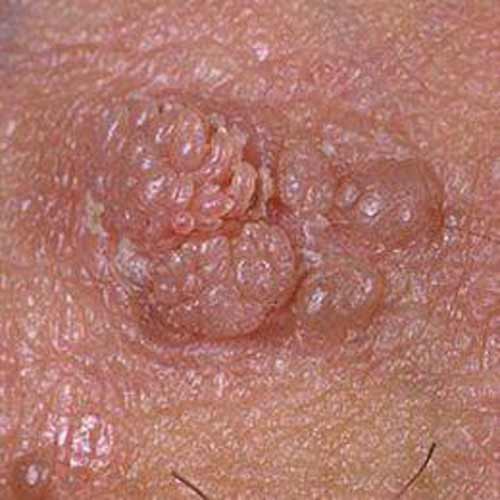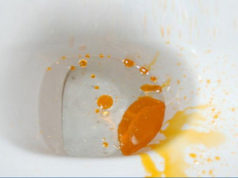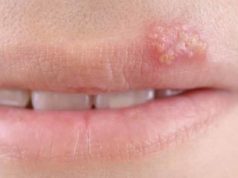Penile eczema affects a good number of men all over the planet. Here is an insight into the causes, how this condition looks like in pictures, symptoms and how to treat it.
Can you get eczema on your Male Reproductive Organ?
Before you get to know how eczema gets to your genitals, find out what this condition is exactly.
Eczema is also known as atopic dermatitis and is synonymous with eczema in all respects.
The term eczema in layman’s language has been historically been used to refer to a topic or eczema that is endogenous.
However, with time, medics have come to identify many other types of eczema and their causes.
Eczema normally presents on any part of the body and usually as an itchy, red rash and vesiculation (presence of small blisters under the surface of the skin) mostly localized in the anterior part of the elbow, the cubital fossa or the hind of the knees, the popliteal fossa.
Apart from this preference in localization, eczema may be diffuse affecting the whole body.
Other areas of the body on which eczema can occur include the scalp, the wrist, ankles and the genitals.
Eczema is caused by factors that may range from having a genetic predisposition to behavioral causes.
Fortunately, the signs and symptoms of eczema are slowly alleviated and tolled down as children grown older and so does the prevalence in older ages.
There are several types of eczema including:
- Allergic contact dermatitis
- Irritant contact dermatitis
- Infantile seborrheic eczema
- Varicose eczema
- Discoid eczema
- Atopic eczema
- Adult seborrheic eczema
When it comes to eczema of the male reproductive organ (MRO), it is known as penile dermatitis.
This condition is among the commonest of penile dermatological disorders including others such as balanitis (inflammation of the glans ), posthitis (inflammation of the foreskin) and balanoposthitis (both glan and the foreskin); (West DS, Papalas JA, Selim MA, Vollmer RT., 2013). This condition exists as two different types or categories depending on what has caused the eczema:
- Allergic penile dermatitis: eczema of the male organ that results from allergens or factors that induce a type 1 hypersensitivity reaction (immediate). Note that allergens vary from one person to the other and will therefore not be universal.
- Irritant penile dermatitis: in this type, anything that causes irritation can result in inflammatory bumps on the skin of the MRO. They do not necessarily have to be allergens in this case.
However, as you may have come to notice, most irritants are allergens and this therefore draws a really thin line between the two types of penile eczemas.
What are the chances of getting it?
The higher the risk of exposure and exposure to irritants and allergens, the higher the chance that you will get eczema on the MRO.
This means that it is unlikely that you will get this kind of eczema when the risk factors are in tolerable quantities or present in low frequencies.
Some of the causes that lead to eczema will be discussed later in this material so that you can identify what you may be allergic or what irritant you may be exposing yourself to.
What parts does it affect
Penile eczema can affect the head of the MRO, the shaft and the foreskin if present.
According to Brian J. Morris and John N. Krieger (2017), despite the fact that topical antimicrobials have proven themselves useful in treating penile inflammatory conditions, non-optimal intake of the practice of circumcision reduces the efficacy of the available conventional treatment agents.
This means that those who are not circumcised may have a higher incidence of such inflammatory conditions including eczema.
Causes
What are the causes of eczema? These are factors that lead to the small skin inflammations on the dermis. There are factors that are simple and easily related to dermatitis while others are a bit complex. Well, not to worry, the main causal factors have been covered in this section.
Poor hygiene, heat and sweat:
Penile eczema may occur when you have sweat accumulated around your genitals. You may have done your work out and not taken a shower to rid your genitals of the sweat and dirt.
Such may lead to irritation on the skin of the MRO and eventually cause eczema.
Heat provides discomfort and would even exacerbate the irritation. It starts as a tingly effect and scratching may lead to occurrence of dermatitis.
It is therefore recommended that you take a shower especially if you work out, do a rigorous job or live in an area that has high humidity.
According to Brian J.M., and John N.K. (2017), the ammonia that is released in urine is normally a bacterial hydrolysis of the compound, urea.
The ammonia can lead to inflammation due to irritation of the skin if not washed off.
Tightly fitting undergarments
Another reason your genitals may hold some sweat and generate heat is when your undergarments are tight. Wearing tight clothing retains moisture and irritates the skin.
This ordeal is further worsened when your undergarment is of certain fabrics that do not absorb moisture.
Shower products
A common cause of irritant penile dermatitis is chemicals that you use to shower with. Most soaps nowadays contain irritants and some topical allergens.
Some of these irritants are surfactants, common ingredients in soap for purposes of increasing the wettability of surfaces, foaming and for antimicrobial properties.
The inclusion of sodium lauryl sulfate or benzalkonium chloride in most of the soap products has been associated with some degree of irritation and allergy on not only the MRO, but the whole body.
Certain fabric
There are clothing materials that are good absorbents of moisture. Such includes cotton undergarments. When the moisture is absorbed, it dries the skin ridding the genital of moisture and allowing it to lose the moisture to the outside through outer clothing.
However, some fabric such as those made of nylon are moisture retainers and hence accumulate sweat on the MRO. Irritation arising could lead to eczema.
Source of water
You will need to check that you get your water from a clean source. Some sources may contain water disinfectants including chemicals such as hydrochloric acid or chlorine. The two could irritate the skin of the MRO.
Latex
Continuous exposure to latex products has been documented in literature as prominent sensitizers on the human body that could lead to mild or fatal reactions.
However, unawareness among many people is still significant (Kumar, R. P. (2012)).
Latex is natural rubber latex (NRL) and is a liquid dispersed in another liquid, such as rubber particles and water and contains more than 250 proteins.
In the context of penile eczema, latex/rubber condoms may cause irritation to the skin as found by Turjanmaa, K., & Reunala, T. (1989) and published in the Journal of Genitourinary Medicine.
Medication
there are many drugs that have eczema as their side effects. They are however rarely mentioned perhaps due to the non-severity of the eczema.
However, some of these drugs are over-the-counter (OTC) drugs hence raising the need to identify them.
According to a report made by the University of Milan (Eczema, Ronald Marks, ed., Martin Dunitz Ltd, London), they include antifungals, antivirals, idoxuridine, antiparasitics, amoxicillin and erythromycin among many others.
Pictures

Symptoms
Symptoms of penile dermatitis could vary between people and may be mild or worse. It normally begins as a small rash that is itchy.
The reflex action towards an itch, scratching, would increase the extent of the rash. If you give in to the reflex, then it may worsen. You can best contain the inflammation by rubbing or pressing the area to prevent neuronal transmission of the itch.
The skin may get dry and become scaly. Blisters may be incident as small tiny bumps on the skin of the MRO. Remember that this could occur either on the penile shaft, glans or the foreskin.
At this point, infections are on the lounge for any imminent opportunity to have open blisters and bruises infected. The blisters are medically referred to as vesiculations.
Complications may therefore arise including balanitis, posthitis or balanoposthitis and could be worse with an appreciable amount of pain and pus discharge.
When this is further not contained with the administration of antibiotics, it could lead to abscesses and erysipelas.
The MRO also tends to turn red. This is a cardinal sign of inflammation. Since the MRO has a very sensitive skin, the signs of inflammation are normally significant even for mild cases of eczema.
With such kind of information, it is now possible for you to identify eczema and respond to it with the medication that will be discussed in the later sections of this material.
How to get rid Remedies
You can opt for simple home remedies to get rid of penile eczema. Such practice may include:
Use cold compress
this will help in relieving any pain or the itch on the MRO. To do this, cool some water or get some ice cubes.
Now, using a clean towel, wrap the ice cubes with it or dip the towel in the cold water then press gently on the MRO for a while.
Intervals of 10 seconds will be enough. This will prevent you from scratching and making the eczema worse or bruising your MRO and consequent infections.
Essential oils
These oils have a nourishing effect and act as humectants. As humectants, they prevent further drying of the skin by retaining the skin moisture.
To add, some of these oils leave a cooling effect on the skin when applied.
To effect this, use a clean cotton wool swab to apply the oil on the area with eczema then leave to sit for 5 to 10 minutes before rinsing off with some cool water. Do this thrice a week until it is gone.
Aloe gel
This herb has many beneficial effects on the skin. It is a natural anti-inflammatory agent and is a potent antimicrobial.
Therefore, this gel will be good for the eczema when not or when infected. If you have the fresh aloe plant, then cut it open and extract the gel from the leaf.
You can even apply the leaf onto the area then rub gently. It will be a bit itchy afterwards, but do not scratch.
When there is an infection, the aloe gel will too be beneficial. Rinse with some warm water and repeat daily until the eczema is gone.
Natural astringents
Citrus fruits are natural astringents and would help in reducing excessive drying and scaling of the skin of the MRO. They are also natural anti-oxidants.
Being that inflammatory and infected lesions have oxidants, using reducing agents such as ascorbic acid to reduce this will help in accelerating the healing process.
Treatment (medication)
There are conventional ways in which penile dermatitis can be treated.
The medications may be prescribed for your condition or you may get these over the counter in retail stores.
The following medications are indicated for treatment of penile dermatitis:
Anti-inflammatories
They reduce the inflammation of the skin secondary to the irritation or allergen exposure.
Anti-inflammatory drugs include the likes of ibuprofen and diclofenac.
Others include betamethasone or hydrocortisone and are preferably administered as topical creams or ointments.
Anti-histamines
since penile dermatitis can be caused by an allergen, you may get antihistamines such as chlorpheniramine or cetririzine to ease off the allergic response by reduction of histaminergic responses. They are most useful at night when you need the sleep amidst the itchy feel.
Emollients
you will need to apply some of these so as to moisturize your skin and reduce on its dryness and scaly nature of a penile eczema.
Prevention
You can prevent the occurrence of penile eczema in the following ways:
- Loosen your tight clothing and undergarments. This will help you get rid of any moisture that may accumulate under the garments and reduce the heat felt in the area. Therefore, there will be no irritation on the MRO and so will predisposition the condition
- You will need to avoid certain known allergies: when the allergen that results in eczema has been identified, then it is pertinent to ensure that you reduce or totally prevent exposure to it. Such allergens are perfumes, creams, soaps and lotions. In order to come up with a definite conclusion on what not to use, you can seek the consult of your dermatologist.
- Do some moisturizing: dermatitis presents as a dry scaly skin. You will therefore require that you moisturize the skin often using emollients. You can also prevent the dehydration of the skin suing humectants such as glycerin and astringents such as ascorbic acid. When the skin is dry, there is a tendency to have some irritation that may lead to eczema.
- Resist the urge to scratch: scratching increases the extent and the severity of any mild pre-existing penile eczema. This kind of action could lead to bruising and increase in the risk of infection. Instead of scratching, you could simply rub gently on the area or use a cold compress.
- Get some latex-free condom. Since latex is now a known cause of allergic dermatitis of the MRO, it is prudent to notice that you have such an allergy and make efforts to get a non-latex condom.
Other Penile Conditions



